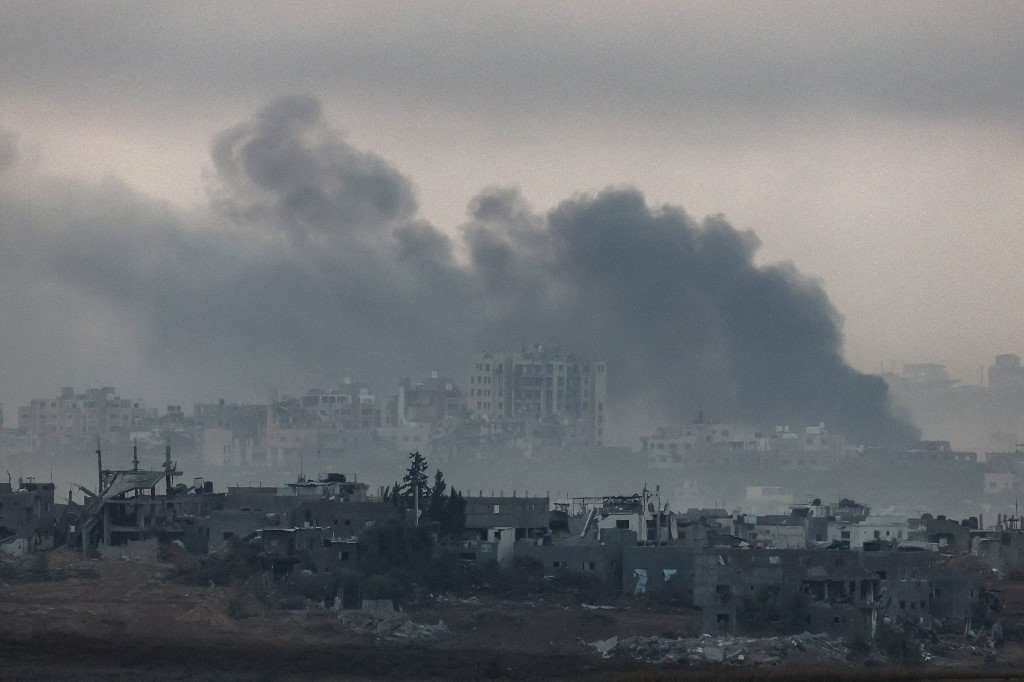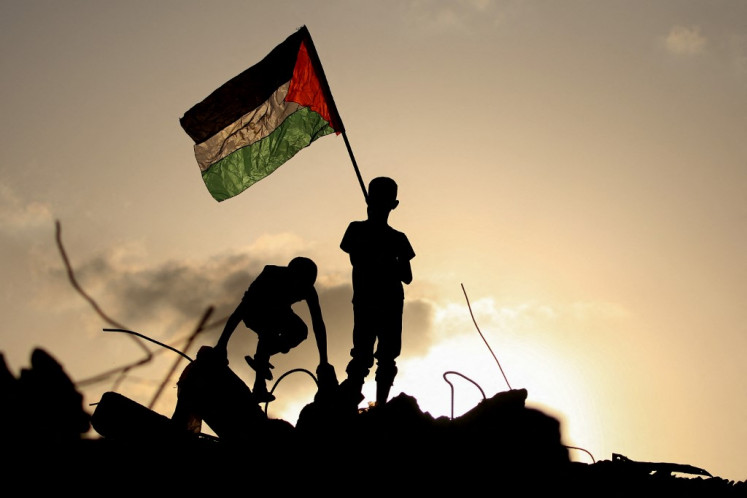Popular Reads
Top Results
Can't find what you're looking for?
View all search resultsPopular Reads
Top Results
Can't find what you're looking for?
View all search resultsIsrael intensifies southern Gaza offensive
Israel's closest ally the United States has said the Israeli offensive in the south should not repeat the "massive" civilian toll it has had in the north.
Change text size
Gift Premium Articles
to Anyone
I
sraeli forces pressed ahead with their air and ground bombardment of southern Gaza Strip, killing and wounding dozens of Palestinians, even as the United States and the United Nations repeatedly urged them to protect civilians.
Israel's closest ally the United States has said the Israeli offensive in the south should not repeat the "massive" civilian toll it has had in the north.
But residents and journalists on the ground said the intense Israeli air strikes in the south of the densely populated coastal enclave included areas where Israel had told people to seek shelter.
At the United Nations, Secretary-General Antonio Guterres appealed to Israel to avoid further action that would make the already dire humanitarian situation in Hamas-run Gaza worse, and to spare civilians from more suffering.
"The Secretary-General is extremely alarmed by the resumption of hostilities between Israel and Hamas... For people ordered to evacuate, there is nowhere safe to go and very little to survive on," UN spokesperson Stephane Dujarric said.
Israel largely captured the northern half of Gaza in November, and since a week-long truce collapsed on Friday they have swiftly pushed deep into the southern half.
Hamas ally Islamic Jihad's armed wing said its fighters engaged in fierce clashes with Israeli soldiers north and east of Khan Younis, Gaza's main southern city.
Israeli tanks have driven into Gaza across the border and cut off the main north-south route, residents said. The Israeli military said the central road out of Khan Younis to the north "constitutes a battlefield" and was now shut.
Philippe Lazzarini, who heads the UN agency for Palestinian refugees in Gaza (UNRWA), said the resumption of Israel's military operation was repeating "horrors from past weeks" by displacing people who had been previously displaced, overcrowding hospitals and further strangling the humanitarian operation due to limited supplies.
"The evacuation order pushes people to concentrate into what is less than one-third of the Gaza Strip. They need everything: food, water, shelter, and mostly safety. Roads to the south are clogged," Lazzarini said.
"We have said it repeatedly. We are saying it again. No place is safe in Gaza, whether in the south, or the southwest, whether in Rafah or in any unilaterally so-called 'safe zone'."
As many as 80 percent of Gaza's 2.3 million people have already fled their homes in the eight weeks of war that has turned the enclave into a wasteland.
On Monday, Israel ordered Palestinians to leave parts of Khan Younis, indicating they should move towards the Mediterranean coast and towards Rafah, a major town near the Egyptian border.
Desperate Gazans in Khan Younis packed their belongings and headed towards Rafah. Most were on foot, walking past ruined buildings in a solemn and silent procession.
In Washington, officials said it was too early to definitively say whether Israel was following US advice to take concrete steps to ensure protections for civilians, although a State Department spokesperson said it was an "improvement" that Israel was seeking evacuations in targeted areas as opposed to entire cities.
US National Security Advisor Jake Sullivan said Washington expected Israel to avoid attacking areas identified as "no-strike" zones in Gaza.
He said the US had discussed with Israel how long the war with Hamas should continue, but he declined to share that timeline.
A senior Israeli official said it was taking the time to order more precise evacuations in order to limit civilian casualties, but that Israel could not rule them out altogether.
"We did not start this war. We regret civilian casualties but when you want to face evil, you have to operate," the official said.
Israel launched its assault to wipe out Hamas in retaliation for an Oct. 7 cross-border attack by Hamas gunmen on border towns, kibbutzim and a music festival. The militants killed 1,200 people and seized 240 hostages, according to Israeli tallies - the deadliest single day in Israel's 75-year history.
Over 100 of the hostages were freed during a seven-day truce last month. Israeli authorities say seven civilians and an army colonel died in captivity, while 137 hostages remain in Gaza.
In the eight weeks of warfare, the Gazan health ministry said at least 15,899 Palestinians, 70 percent of them women or under 18s, have been killed. They say thousands more are missing and feared buried in rubble, with about 900 killed since the truce ended on Friday.
Israel accuses Hamas of putting civilians in danger by operating from civilian areas, including in tunnels which can only be destroyed by large bombs. Hamas denies it does so.
The Wall Street Journal reported on Monday, citing US officials, that Israel had assembled a system of pumps that could be used to flood Hamas tunnels.
It was not clear whether Israel would consider using the pumps before all hostages were released, according to the story.










